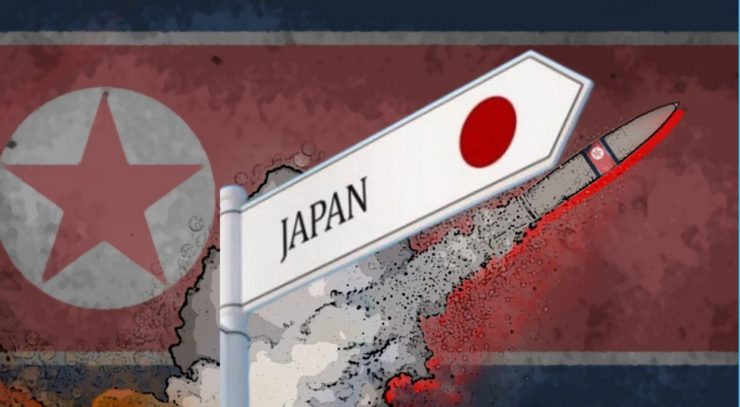
Will Fumio Kishida be able to abandon his harsh rhetoric against Pyongyang and strengthen his popularity with Japanese voters, or is he counting on favour from the DPRK leadership?
Not even a few months have passed since the Japanese Defence Ministry’s threatening statements to Pyongyang over North Korea’s test launch of a ballistic missile towards the Sea of Japan on January 14 this year.
“The DPRK’s actions threaten the peace and security of our country, the region and the world. Such ballistic missile launches violate UN Security Council resolutions and pose a serious problem,” an official message on the Japanese military’s website blared, “Japan has strongly protested and condemned North Korea. To protect the lives and property of our citizens, we will continue to work closely with the United States, South Korea and other countries”. However, the Japanese military later admitted that the missile launched from DPRK territory of an unidentified type fell in the sea outside the Japanese economic zone without reaching it.
Against this, to put it mildly, not very favourable foreign policy background, created by the hands of Tokyo itself, Japanese Prime Minister Fumio Kishida has decided to seek Pyongyang’s favour. According to The Financial Times with reference to sources in Washington and Tokyo, the Japanese prime minister, because of the falling popularity of the cabinet inside the country, has decided to improve relations with North Korea and thus earn political dividends in an attempt to save his shaky position.
During a speech in the country’s parliament, Kishida said that it was necessary to establish relations with Pyongyang without delay, that he was ready to take the initiative to resume high-level ties and expressed hope for a “diplomatic breakthrough”. However, the purpose of organising a meeting with North Korean leader Kim Jong-un was to discuss the release of Japanese citizens abducted by North Korea, as Tokyo claims, several decades ago.
Frankly speaking, this is a very original way to call Pyongyang to the negotiating table, starting with the “traditional” demands that have become a stumbling block and brought bilateral relations to a standstill more than once. It should be recalled that the last meeting between the Japanese Prime Minister and the DPRK leader took place in 2004, when Junichiro Koizumi met with Kim Jong Il in Pyongyang.
Relations between Japan and the DPRK have deteriorated markedly in recent years amid the active development of the military alliance between Washington, Seoul and Tokyo, regular American military exercises with the participation of allies and Pyongyang’s retaliatory artillery firing and missile test launches. At the same time, in early January this year, Kim Jong-un expressed condolences to the Japanese prime minister in connection with the earthquake that killed more than 100 people. In an official telegram, the DPRK leader wished the residents of the affected area of Japan quick elimination of the consequences and restoration of stable life. This gesture from Pyongyang was perceived in Tokyo as a positive signal, since the last time North Korea expressed condolences in 1995 in connection with the devastating earthquake in the Hanshin-Awaji region.
The Japanese prime minister’s office declined to comment on the organisation of the summit with the DPRK, but pointed to Kishida’s recent statements in media interviews, where he noted his desire to use different approaches to the DPRK and his determination to hold direct talks with Kim Jong-un “without any conditions”. However, according to political analysts, for the domestic Japanese audience, the refusal of preconditions in communication with Pyongyang does not look like an unconditionally strong move that will strengthen the prime minister’s shaken position.
According to a public opinion poll conducted by the popular liberal newspaper Asahi, the current head of the Japanese cabinet, F. Kishida, with 7 percent of support, ranked only fourth on the list of politicians whom voters would like to see in office. His rating turned out to be extremely low against the background of the scandals that broke out in the country with falsification of financial statements of a number of high-ranking representatives of the ruling Liberal Democratic Party of Japan. According to a survey by Yomiuri, another authoritative publication, the level of support for Kishida’s cabinet does not exceed 24 percent, which is a record low for the ruling party that regained power in 2012.
In any case, experts agree that relations between Japan and North Korea remain one of the last diplomatic cards in Prime Minister Kishida’s hands that he can play to boost his ratings. However, Tokyo’s first steps in the North Korean direction do not portend anything encouraging.
Bakhtiar URUSOV, political observer, especially for online magazine “New Eastern Outlook”